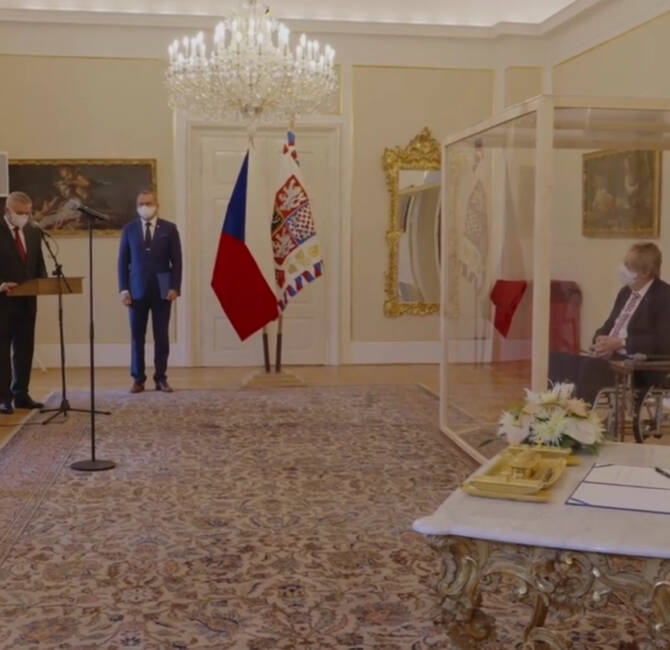Czechia – More than two months after the 8-9 October parliamentary elections which resulted in the victory of the SPOLU (ODS, KDU-ČSL, TOP09) and PirSTAN (Pirates and Mayors) coalitions, and with President Miloš Zeman having finally accepted the “pirate” Jan Lipavský’s appointment as foreign minister, the new Czech government’s ministers were appointed on 17 and 18 December.
In addition to the prime minister, 57-year-old Petr Fiala, a former academic from southern Moravia, former minister of education (2012-2013) and former deputy speaker of the Chamber of Deputies (2017-2021), the Civic Democratic Party (Občanská demokratická strana, ODS) is in charge of five ministries, with:
- Zbyněk Stanjura, 57, as finance minister;
- Pavel Blažek, 52, as justice minister;
- Jana Černochová, 48, as defence minister;
- Martin Kupka, 46, as transport minister;
- and Martin Baxa, 46, as culture minister.
The mayors’ movement (STAN) is in charge of four ministries, with:
- Vít Rakušan, the 43 year-old leader of the Mayors’ Movement (STAN), as first deputy prime minister and interior minister;
- Jozef Síkela, 54, as industry and trade minister;
- Petr Gazdík, 47, as minister for education, youth and sports;
- and Mikuláš Bek, 57, as European affairs minister.
The Pirate Party was given three ministries, with:
- Ivan Bartoš, the 41 year-old leader of the Pirate Party, as fourth deputy prime minister and minister for digitisation and regional development;
- Jan Lipavský, 36, as foreign affairs minister;
- and Michal Šalomoun, 47, as legislation minister.
Finally, the two ODS partners in the SPOLU coalition, KDU-ČSL and TOP09, got two ministries each, with:
- Marian Jurečka, the 40 year-old leader of the KDU-ČSL Christian Democratic party, as second deputy prime minister and minister for labour and social affairs;
- Anna Hubáčková (KDU-ČSL), 64, as environment minister;
- Vlastimil Válek, the 61 year-old TOP09 leader, as third deputy prime minister and health minister;
- and Helena Langšádlová (TOP09), 58, as minister for science, research and innovation.
Two important issues: Covid-19 and the Turów mine
Among the various issues that the new government will have to deal with very quickly is the poisoned “gift” that Andrej Babiš left to his successor in the form of a decree instituting mandatory vaccination against Covid-19 for people over 60 and certain professions. Initially, the new health minister, Vlastimil Válek (TOP09), had announced his intention to discard the decree outright. However, he later said he considers it necessary to wait and see how the public health situation evolves with the spread of the new Omicron strain of the coronavirus. The new minister’s vacillations regarding compulsory vaccination have been criticised by right-wing populist Tomio Okamura, the leader of the Freedom and Direct Democracy party (SPD), as being something close to a flip-flop.
Another thorny issue will be the dispute between Czechia and Poland over the Turów mine, whose resolution is likely to determine the climate between the two Visegrád Group countries, at a time when the V4 alliance may not be as important to all the parties in the new coalition now in power in Prague as it was to the previous government led by Andrej Babiš (ANO).




